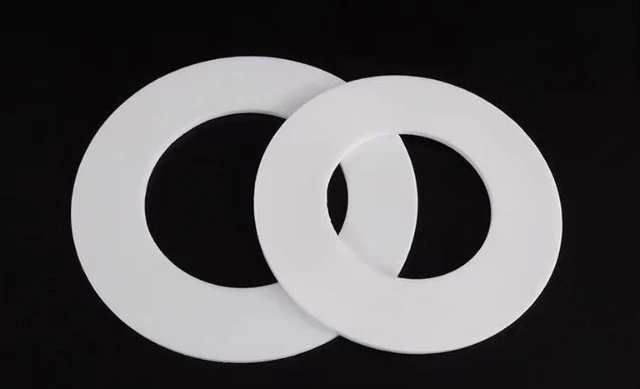Seals are the unsung heroes of industrial operations—until they fail. While PTFE (polytetrafluoroethylene) remains a popular choice for its chemical resistance and non-stick properties, high-alkali environments and mechanical stress can expose its limitations. This guide identifies critical failure scenarios for PTFE seals and explores superior alternatives that ensure reliability in demanding conditions.
Understanding PTFE’s Limitations in Critical Sealing Applications
PTFE excels in many environments, but three key factors can compromise its performance: alkaline degradation, creep deformation, and temperature extremes. Recognizing these vulnerabilities helps engineers avoid costly downtime and equipment damage.
Alkaline Attack: Industries and Scenarios at Risk
PTFE’s resistance to acids doesn’t extend equally to strong alkalis. Industries like chemical processing, pharmaceutical manufacturing, and food processing—where sodium hydroxide (NaOH) or potassium hydroxide (KOH) are common—report premature PTFE seal failures. Research shows that prolonged alkali exposure weakens PTFE’s molecular structure, leading to:
- Swelling and cracking: Alkalis penetrate PTFE’s matrix, causing dimensional instability.
- Loss of sealing force: Degraded material can’t maintain compression against flanges or joints.
Have you considered how alkali concentration and temperature interact to accelerate PTFE degradation?
Creep Deformation: Impact on Load Retention and Seal Lifespan
Under constant pressure, PTFE “cold-flows” (creeps), losing its ability to rebound and maintain a seal. This is critical in:
- High-static-load applications: Valves, pumps, and reactors requiring long-term compression.
- Cyclic stress environments: Equipment with frequent pressure fluctuations.
Carbon-filled PTFE improves creep resistance by up to 40% compared to virgin PTFE, thanks to reinforced fiber structures that stabilize the material under load.
Temperature Thresholds: Where PTFE Falls Short
While PTFE handles extreme cold (-260°C) and moderate heat (+250°C), sustained temperatures above 260°C cause rapid degradation. In high-heat scenarios like aerospace or automotive systems, PTFE seals may:
- Become brittle: Losing elasticity and sealing capability.
- Emit harmful fumes: Decomposing PTFE releases toxic gases above 300°C.
Navigating Material Alternatives
When PTFE isn’t enough, these advanced materials offer tailored solutions for alkali resistance, temperature stability, and creep mitigation.
High-Temperature Solutions: PEEK vs. Graphite-Reinforced Composites
For temperatures exceeding 260°C:
- PEEK (polyether ether ketone): Maintains strength up to 300°C and resists steam/chemical exposure. Ideal for semiconductor manufacturing and oil/gas systems.
- Graphite composites: Withstand 500°C+ but require careful handling due to brittleness.
Alkali-Resistant Options: UHMW-PE and Fluorosilicone Hybrids
Where alkalis dominate:
- UHMW-PE (ultra-high-molecular-weight polyethylene): Resists concentrated alkalis and abrasion, suited for food processing equipment.
- Fluorosilicone hybrids: Combine PTFE’s chemical resistance with silicone’s flexibility, perfect for dynamic seals in pharmaceutical mixers.
Creep Mitigation Strategies: Carbon-Filled PTFE and Spring-Energized Designs
For long-term load retention:
- Carbon-filled PTFE: Ideal for static seals in industrial hydraulics.
- Spring-energized seals: Use metal springs to compensate for material creep in rotating shafts.
Did you know? Spring-energized designs extend seal life by 3× in high-vibration environments.
Upgrade Your Sealing Strategy with KINTEK
PTFE isn’t obsolete—it’s just one tool in a broader materials toolkit. For industries facing alkali corrosion, extreme heat, or unrelenting stress, selecting the right seal material is a precision decision.
KINTEK specializes in high-performance sealing solutions, from custom PTFE components to advanced PEEK and hybrid designs. Whether you’re prototyping or scaling production, our expertise ensures your seals withstand the harshest conditions.
Ready to eliminate seal failures? Explore KINTEK’s engineered solutions tailored for your operational demands.
Visual Guide

Related Products
- Customizable PTFE Seals Filter Holders for Versatile Applications
- Custom PTFE Volumetric Flasks for Advanced Scientific and Industrial Use
- Custom PTFE Square Trays for Industrial and Laboratory Use
- Custom PTFE Measuring Cylinders for Advanced Scientific and Industrial Applications
- Custom PTFE Sealing Tapes for Industrial and High Tech Applications
Related Articles
- The Physics of 'Fit and Forget': How PTFE Re-engineers Mechanical Systems
- Your Plant's Silent Killer: Why Standard Valves Fail with Corrosive Chemicals (And the One Fix That Works)
- That Ghost Peak in Your Data? It’s Not Your Fault.
- The Resilient Seal: Why Spring-Energized PTFE Masters Hostile Environments
- Why Your Lab Plugs Stick and Contaminate: The Hidden Science of Surface Energy




















